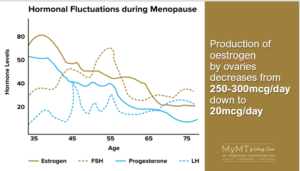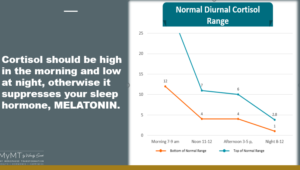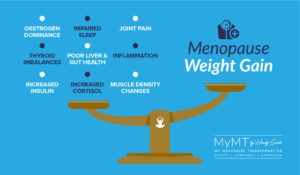Did you know that lack of sleep affects your fat metabolism and storage?
Sleep and its disorders are becoming increasingly important in our sleep deprived society which is why scientists are learning that our sleep quantity and quality is intricately connected to various hormonal and metabolic processes in the body. Research shows that sleep deprivation and sleep disorders may have profound metabolic and cardiovascular implications and for women navigating menopause this is important to note. Lack of sleep increases our risk of heart disease as we move into post-menopause. Which is a concern, because heart disease for post-menopausal women is an urgent problem and menopause hormonal changes herald in the start of our biological ageing. [I mention this in my short video at the bottom of this blog, on the ‘Science of your Weight Gain in Menopause‘ – I hope you can grab 5 minutes to watch it over the New Year break].

As a sleep deprived society, there is evidence showing that our overnight sleep, on average is only 6 hours a night. A century ago it was 9 hours.
“Prevalence of both diabetes and obesity has increased to acquire pandemic proportions. Though other factors such as diet and reduced physical activity have contributed to the obesity epidemic the impact of sleep dysregulation on causing metabolic derangements is being increasingly recognized. Considering only a small percentage of people can maintain a healthy weight over a long period on diet and exercise alone, the impact of sleep on weight has opened a new venue for potential intervention.” [Sharma & Kavuru, p. 2, 2010].
Why your sleep is important for restoring your metabolism overnight:
I know that we often hear about our metabolism. Fitness programmes and dieting programmes talk about metabolism as well – but so many of them, don’t understand that our sleep has an incredible effect on our metabolism too.
Your metabolism is defined as the whole range of biochemical processes that occur within you. It constitutes the two processes of anabolism (tissue repair and restoration) and catabolism (tissue break down). In simpler terms, metabolism is the amount of energy (calories) the body burns to maintain itself. Yes, muscle matters to this, as does the food we eat, but so too does sleep. And when you are going through menopause, it’s this lack of sleep that affects our metabolic rate and slows it down, as does the loss of muscle tissue too.
When we sleep normally and deeply between 2-4am, our metabolism and brain temperature are lowered. This provides your body with an opportunity to deal with any damage done during the day, e.g. from exercise or from the unhealthy foods you might eat, or other stress that your body has been under (I include emotional stress in this too).
Every day our metabolism is under stress – from the foods we eat, to the exercise we do (or don’t do) and to the foods, chemicals and pollutants we expose our body to as well. That’s why, as we age, we must focus on strategies to turn this around. From improving our sleep, to our liver health, the type of exercise we do and of course the nutrients we consume daily, if we are going to set ourselves up for our healthy ageing, then changing how we look after ourselves during our mid-life transition matters. I have lots of these solutions in my Masterclass on Menopause webinar, which you can read about in the ‘programmes’ link on the website – I was taking this seminar around New Zealand, Australia and the United Kingdom, before the world turned to chaos, so I hope you can listen to the webinar, which only has a small admin fee of NZ$15 on it.

During our menopause transition, our lowering oestrogen levels impact on our melatonin production (this is your sleep hormone) and your cortisol production (this is one of your stress hormones). That’s why, if you are in your menopause transition, it’s a ‘perfect storm’ for your changing health if you aren’t sleeping. Changing oestrogen and progesterone levels, can decrease melatonin production and increase cortisol production.
The result? – Your body doesn’t utilise fats efficiently for healing and restoring your body overnight.
In my newsletters this year, I’ve talked a lot about our chronic stress hormone cortisol. This hormone is important to our sleep quality and quantity. Too much production of cortisol during the day and evening, cause cortisol levels to remain higher than they should. Paradoxically, so does lack of sleep. High cortisol levels changes the use and uptake of glucose into your cells as well as into your brain cells. If you have a persistent foggy brain when you wake up in the morning and are always feeling forgetful AND you aren’t sleeping, then I encourage you to ‘join the dots.’ (Click here to read about foggy brain and what to do about it).

For those of you struggling with your sleep night after night, there’s a reason you might not be able to fit your jeans or your skirt or your blouse or your dress … laboratory studies have clearly shown that sleep deprivation can alter the glucose metabolism and hormones involved in regulating metabolism overnight – these hormones include your gut hormones [leptin and ghrelin] and with these hormones out of balance, then you don’t metabolise fats very well overnight. Your body ends up storing fats in fat cells instead. For menopausal women, these fat cells dominate around your diaphragm and abdomen.
I still remember when I couldn’t sleep night after night. I was up and down like a yo-yo and it didn’t help that hubbie was lying there snoring blissfully unaware of my despair. The supplements didn’t help nor did the HRT. Although I knew that not sleeping is the slippery slope to fibromyalgia and other auto-immune diseases, the one I was most concerned about, was the weight gain. This is because when we don’t get our deep, healing sleep, our hormones that help us to burn fat overnight become disrupted too. It’s the same for the thousands of women who join me on my programmes.

If you are putting on weight or you are feeling constantly cranky, irritable and exhausted, then please let me help you turn this around. Women on my 12 week programmes (there are two different ones depending if women are overweight or not), love their learning in the first online module they receive, which is simply called ‘SLEEP ALL NIGHT’. Michaela from Canada, posted this recently.

For those with poor gut health, they also love discovering that our gut is also on a 24 hour night/day rhythm, so as they learn to sleep all night, their gut health starts to improve as well. [This information is also in a stand-alone module for you. Read about it HERE].
If this is you, then I hope you can join me on my new year January sale which you can read about HERE. I have a short video for you below, called ‘The Science of Your Menopause Weight Gain’ to help you understand what is happening with our weight gain in menopause. Lack of sleep is just one part of the puzzle. Becoming oestrogen dominant as your hormones change is the other part, as is your changing liver and gallbladder (if you don’t have a gallbladder, then your liver health becomes even more important for your menopause weight loss).
Whilst 2020 has certainly emerged as a year of challenges for all of us with the pandemic and I know that many of you are experiencing extraordinary changes in your life, I hope that you might be able to join me on my Transform Me programme which is on sale for you.

Dr Wendy Sweet [PhD] MyMT Founder/ Member: Australasian Society of Lifestyle Medicine.
References:
Ness, K., Strayer, S., Nahmod, N. et al. (2019) Four nights of sleep restriction suppress the postprandial lipemic response and decrease satiety. Journal of Lipid Research, 2019; jlr.P094375 DOI: 10.1194/jlr.P094375
Sharma, S., & Kavuru, M. (2010). Sleep and metabolism: an overview. International journal of endocrinology, 2010, 270832. https://doi.org/10.1155/2010/270832

